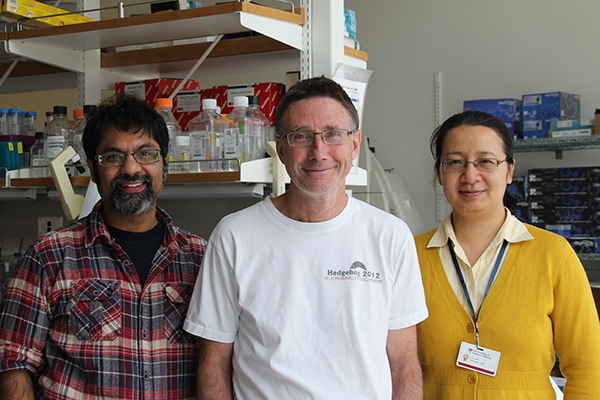
USC Stem Cell scientists have set a “mouse TRAP” to capture the early signs of kidney failure, as described by a recent study published in the Journal of Clinical Investigation. Their new transgenic mouse line uses a technique called TRAP to extract cellular and genetic information from a variety of solid organs.
Invented by scientists at The Rockefeller University in 2008, TRAP involves attaching a fluorescent tag to the protein-making machinery, or ribosomes, of the cell type of interest. Scientists can then collect the tagged ribosomes and determine which active genes are ordering proteins to be made by these ribosomes. (TRAP stands for “translating ribosome affinity purification.”)
Following up on this breakthrough, the USC team — led by Jing Liu, senior research associate in the laboratory of Andy McMahon — has made the technique simpler and more accessible by engineering a TRAP mouse. When bred with any one of thousands of existing strains of transgenic mice, the TRAP mouse produces progeny with tagged ribosomes in specific organs or cell types.
To demonstrate how useful this can be, Liu and her colleagues used TRAP mice to tag four different types of kidney cells and identify early signals of acute kidney injury.
As a consequence of surgery, infections or drug toxicity, five to seven percent of all hospitalized patients experience acute kidney injury, which can lead to chronic kidney disease or death.
Currently, doctors can only detect acute kidney injury a full day after it occurs. The TRAP mouse enables earlier detection, which will greatly improve patients’ health.
“The technology is simple, and the kidney field is very excited about our results,” said Liu. “I anticipate that the TRAP mouse will advance our cellular and molecular understanding of a wide variety of diseases and injuries in many different organ systems.”
Along with Liu and McMahon, co-authors include A. Michaela Krautzberger, Shannan H. Sui, Oliver M. Hofmann, Ying Chen, Manfred Baetscher, Ivica Grgic, Sanjeev Kumar, Benjamin Humphreys and Winston A. Hide.
The research was supported by the Harvard Stem Cell Institute and the California Institute for Regenerative Medicine (53-5178-7980) as well as by Grgic’s fellowship from the Deutsche Forschungsgemeinschaft (GR 3301/4-1).
